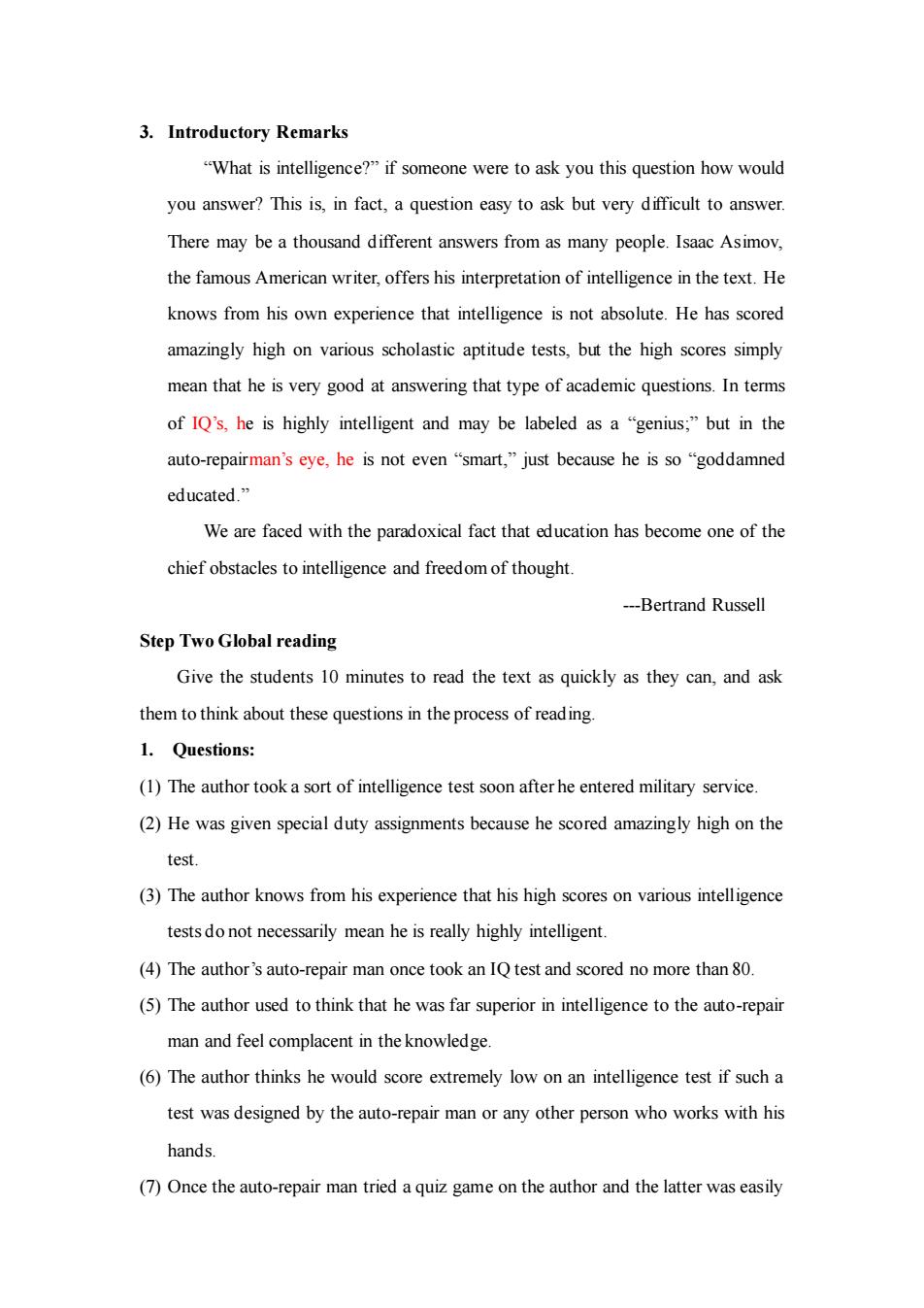正在加载图片...

3.Introductory Remarks "What is intelligence?"if someone were to ask you this question how would you answer?This is,in fact,a question easy to ask but very difficult to answer There may be a thousand different answers from as many people.Isaac Asimov, the famous American writer,offers his interpretation of intelligence in the text.He knows from his own experience that intelligence is not absolute.He has scored amazingly high on various scholastic aptitude tests,but the high scores simply mean that he is very good at answering that type of academic questions.In terms of IQ's,he is highly intelligent and may be labeled as a"genius:"but in the auto-repairman's eye.he is not even"smart,"just because he is so"goddamned educated." We are faced with the paradoxical fact that education has become one of the chief obstacles to intelligence and freedom of thought. --Bertrand Russell Step Two Global reading Give the students 10 minutes to read the text as quickly as they can,and ask them to think about these questions in the process of reading. 1.Questions: (1)The author took a sort of intelligence test soon after he entered military service. (2)He was given special duty assignments because he scored amazingly high on the tes (3)The author knows from his experience that his high scores on various intelligence tests do not necessarily mean he is really highly intelligent. (4)The author's auto-repair man once took an IQ test and scored no more than80. (5)The author used to think that he was far superior in intelligence to the auto-repair man and feel complacent in the knowledge. (6)The author thinks he would score extremely low on an intelligence test if such a test was designed by the auto-repair man or any other person who works with his hands. (7)Once the auto-repair man tried a quiz game on the author and the latter was easily3. Introductory Remarks “What is intelligence?” if someone were to ask you this question how would you answer? This is, in fact, a question easy to ask but very difficult to answer. There may be a thousand different answers from as many people. Isaac Asimov, the famous American writer, offers his interpretation of intelligence in the text. He knows from his own experience that intelligence is not absolute. He has scored amazingly high on various scholastic aptitude tests, but the high scores simply mean that he is very good at answering that type of academic questions. In terms of IQ’s, he is highly intelligent and may be labeled as a “genius;” but in the auto-repairman’s eye, he is not even “smart,” just because he is so “goddamned educated.” We are faced with the paradoxical fact that education has become one of the chief obstacles to intelligence and freedom of thought. ---Bertrand Russell Step Two Global reading Give the students 10 minutes to read the text as quickly as they can, and ask them to think about these questions in the process of reading. 1. Questions: (1) The author took a sort of intelligence test soon after he entered military service. (2) He was given special duty assignments because he scored amazingly high on the test. (3) The author knows from his experience that his high scores on various intelligence tests do not necessarily mean he is really highly intelligent. (4) The author’s auto-repair man once took an IQ test and scored no more than 80. (5) The author used to think that he was far superior in intelligence to the auto-repair man and feel complacent in the knowledge. (6) The author thinks he would score extremely low on an intelligence test if such a test was designed by the auto-repair man or any other person who works with his hands. (7) Once the auto-repair man tried a quiz game on the author and the latter was easily